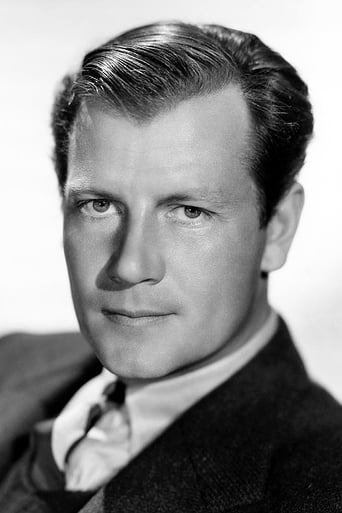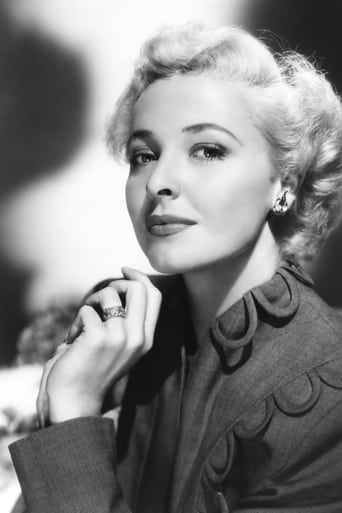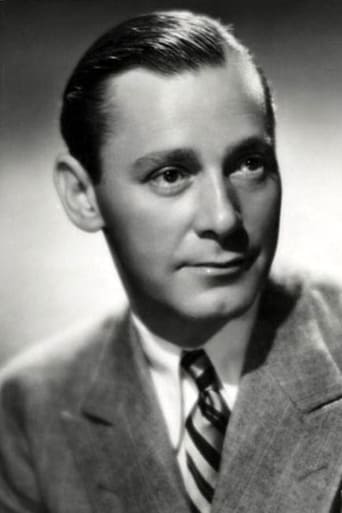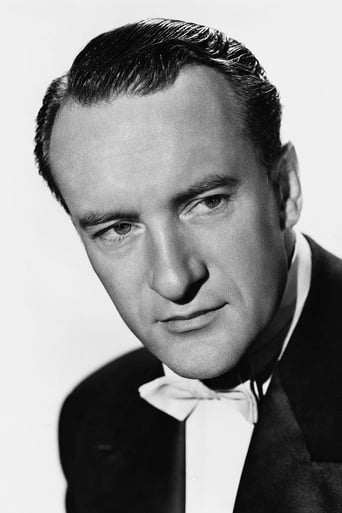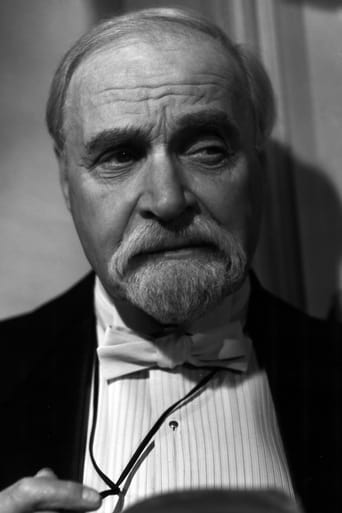Hottoceame
The Age of Commercialism
Moustroll
Good movie but grossly overrated
Nessieldwi
Very interesting film. Was caught on the premise when seeing the trailer but unsure as to what the outcome would be for the showing. As it turns out, it was a very good film.
BeSummers
Funny, strange, confrontational and subversive, this is one of the most interesting experiences you'll have at the cinema this year.
JasparLamarCrabb
Alfred Hitchcock's classic is a precursor to his later SABOTEUR & NORTH BY NORTHWEST. It's a thriller that runs at breakneck speed. Joel McCrae is the reluctant reporter sent to Europe (on the brink of war) and gets caught up in an assassination plot, a very outré peace-movement group and Laraine Day. There's plenty of comic moments infused into the clever script (worked on by, among others, James Hilton & Robert Benchley). McCrae and Day have a lot of chemistry and Herbert Marshall is great as Day's misguided father. Benchley himself plays one of McCrae's soused colleagues and George Sanders is a scene stealer as an unusually resourceful fellow reporter. The great set pieces include the now famous "wrong way windmill" scene. One of Hitchcock's absolute masterpieces. Filmed in the Netherlands and in Long Beach, CA.
seymourblack-1
Excitement, suspense and humour are just a few of the hallmarks of this high-speed espionage thriller that does such a great job of entertaining from start to finish. With numerous plot twists and dialogue that's sharp and witty, the interest level never drops and no doubt, this contributed to making "Foreign Correspondent" the great commercial and critical success that it eventually became. Over the years, it's become one of Alfred Hitchcock's most under-appreciated films, probably for the simple reason that it's been overshadowed by his numerous great achievements in the years that followed. The fact remains however that, especially for a movie released in 1940, it's technically impressive, full of interesting characters and contains a number of very memorable set pieces.In 1939, Mr Powers (Harry Davenport), the aptly-named editor of the "New York Globe" is utterly exasperated by the lack of hard news that he's getting from his European correspondents about the growing threat of war and so decides to send a crime reporter to find out exactly what's happening. The reporter he chooses for the job is Johnny Jones (Joel McCrea), a young brash and politically naïve character who says "give me an expense account and I'll cover anything". Powers renames his new foreign correspondent, Huntley Haverstock and immediately instructs him to leave for London to attend a conference being held by the Universal Peace Party at which the eminent Dutch diplomat, Van Meer (Albert Bassermann) is due to speak.On his way to the event, Haverstock has the good fortune to meet Van Meer and shares a taxi with him but the old man is totally uninterested in talking about political matters and so doesn't provide Haverstock with any useful information. At the conference, the young American meets Carol Fisher (Laraine Day), the daughter of Stephen Fisher (Herbert Marshall) who's the peace organisation's leader and is shocked when Van Meer doesn't turn up to speak to the audience, apparently because he'd been called to attend another conference in Amsterdam. The determined reporter decides to go to Amsterdam to follow Van Meer's activities and is then drawn into a frantic sequence of events when he witnesses a shocking assassination, gets involved is a car chase and in a windmill in the Dutch countryside, discovers that Van Meer has been kidnapped and drugged by a suspicious-looking group of men.After Van Meer and his captors suddenly disappear, Haverstock returns to London with Carol who he'd met with her friend Scott ffolliott (George Sanders) during the car chase. Haverstock and Carol fall in love and plan to marry but when they return to Carol's home and Haverstock sees one of the men from the windmill with her father, he strongly suspects that Stephen Fisher is a Nazi agent and with the help of ffolliott attempts to rescue Van Meer and expose Fisher as a traitor. The events that follow then put Haverstock in some life-threatening situations before he's eventually in a position to try to get his story back to his newspaper in New York.The way in which the assassination is carried out in this movie is truly shocking and the suspense generated during Haverstock's time in the windmill where he's trying to avoid being seen by Van Meer's captors is tremendous. There's also a brilliantly filmed plane crash which is remarkably realistic as is another tense scene involving a high-level escape from a hotel room.Joel McCrea does well as an ordinary guy who's totally out of his depth in his new job and George Sanders, Laraine Day and Albert Bassermann are all excellent in their supporting roles."Foreign Correspondent" which is overtly anti-Nazi and made a strong appeal for the United States to end its policy of neutrality, made its point so effectively that it even drew great praise from Joseph Goebbels who was the German Minister of Propaganda at the time! Whilst the propaganda content of the film is clearly a reflection of the time in which it was made, its terrific combination of adventure, comedy and romance is so enjoyable that its enduring appeal is guaranteed.
James Hitchcock
"Foreign Correspondent" was Alfred Hitchcock's second Hollywood film. (The first was "Rebecca"). The action opens in August 1939, the last days of peace before the outbreak of war. Johnny Jones is reporter with the New York Globe who is sent to Europe to report on the looming crisis, despite the fact that he has little knowledge of, or interest in, foreign affairs. His editor has been impressed by his success in exposing crime in the city and believes that he will display a similar tenacity and courage in uncovering the truth behind the European crisis. Once in Britain, Jones becomes involved with a conspiracy by enemy spies to assassinate- or possibly to kidnap- a Dutch statesman. He also finds time to conduct a romance with the daughter of a prominent British politician. (In Europe Jones goes by the alias "Huntley Haverstock"; to avoid confusion I shall refer to him as "Jones" throughout).Filming in neutral America in 1940, Hitchcock faced a similar problem to which that had confronted him while making his British spy thriller "The Lady Vanishes" in 1938, before war broke out- the unwillingness of the film companies to upset the Nazis. Everyone knew that "The Lady Vanishes" had really been set in Germany, but he had been forced to disguise the setting as an unnamed European dictatorship. Similarly, everyone knew that the villains in "Foreign Correspondent" were supposed to be Germans, but even at the end of the film, when war has broken out and bombs are falling on London, the words "German", "Germany" and "Nazi" are never used.Hitchcock has fun at the expense of American neutralists in the scene where an American sea-captain refuses to allow an American journalist to send a report to an American newspaper from on board his ship, on the grounds that to do so would be a breach of neutrality. The figure of Stephen Fisher, the leader of the "Universal Peace Party" who turns out to be a treacherous enemy agent, may have been a pointed reminder that by 1940 ostensibly pacifist or neutralist organisations on both sides of the Atlantic, such as Hastings Russell's British People's Party or the America First Committee, counted many overt or covert Fascist sympathisers among their members.The film was nominated for the "Best Picture" Oscar, but lost to "Rebecca", Hitchcock's only film to win "Best Picture". It also received five other unsuccessful Academy Award nominations. Today, however, it is difficult to see why it was so highly thought of at the time. Certainly, it contains several effective suspense sequences, notably the scene where Joel McCrea and Laraine Day are hiding in a Dutch windmill from the villains, McCrea's escape across the rooftops of the hotel and the shooting down of the airliner by an enemy destroyer. The final scene, in which McCrea makes an impassioned broadcast to the sound of enemy bombs falling on London, makes a great emotional impact. Hitchcock also displays his fondness for setting key scenes in an iconic building, in this case Westminster Cathedral, although the effectiveness of this scene is undermined by Edmund Gwenn's tendency to play his character for laughs, making it difficult for us to accept him as a dangerous assassin. (The use of the Catholic Westminster Cathedral, rather than its better-known Anglican counterpart St Paul's, is presumably explained by the fact that Hitchcock was himself a Catholic).The film also, however, has a number of weaknesses, not least a confusing plot; the villains' scheme seems particularly baroque and over-complicated. This is perhaps not surprising as the script was written by a committee. Four writers- Robert Benchley, Charles Bennett, Joan Harrison and James Hilton were officially credited but several others appear to have worked on it. Day makes a forgettable heroine- and McCrea, his final scene apart, an equally forgettable hero. (Hitchcock wanted Gary Cooper and Joan Fontaine but Cooper was not interested and Fontaine, the heroine of "Rebecca", was not available). For lengthy periods, in fact, McCrea seems to be replaced as the hero by the much more charismatic George Sanders as Jones's English colleague Scott ffolliott, ostensibly a minor character. (Spelling a surname with two initial lower-case "f"s is a genuine, if unusual, practice among certain British families; other examples include "ffrench" and "ffeatherstonehaugh"). One person who seems to have been impressed with "Foreign Correspondent" was Joseph Goebbels, who called it "A masterpiece of propaganda, a first-class production which no doubt will make a certain impression upon the broad masses of the people in enemy countries". Goebbels was speaking, however, as a professional propagandist, not as a film critic. Seen as a piece of propaganda from the viewpoint of 1940, the film doubtless achieved its aim of raising morale in Britain and of making at least some Americans question the wisdom and morality of remaining neutral while Hitler's armies overran Europe. Seen as a piece of film- making from the viewpoint of 2015, it is not really one of Hitchcock's best. 6/10
Prismark10
Foreign Correspondent is a propaganda piece to get the USA to enter the second world war. Joel McCrea is an American journalist sent to the UK to report on the war as Huntley Haverstock. He tries to interview a Dutch statesman, Van Mier, but instead sees him get shot which leads him to a Nazi spy ring that may have links with a Peace party.Huntley links up with a dapper reporter, Scott ffoliot played by George Sanders and has an attraction with Laraine Day who is the daughter of a pacifist. Future Oscar winner Edmund Gwenn pops up as a sneaky assassin.Plaudits to Alfred Hitchcock for making a stirring war piece in aid of the country of his birth. As an espionage thriller it has its moment with some signature Hitchcock moves but the film does not flow well, actually parts of it is a bit silly, such as Day being upset about the way Huntley booked two rooms at a hotel. However the plane crash scene is done very well.McCrea is a bit bland as the leading man, however Sanders steals the film as the more debonair reporter who seems he might be doing a little more intelligence gathering for a journalist.








